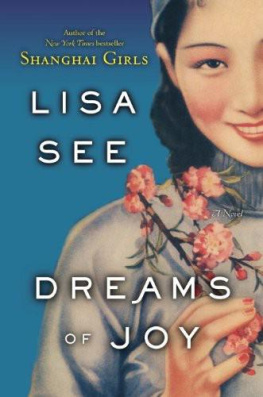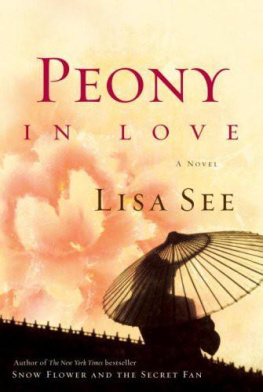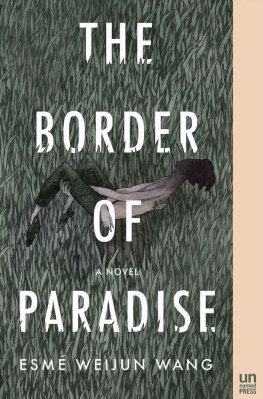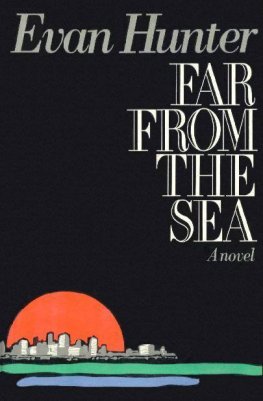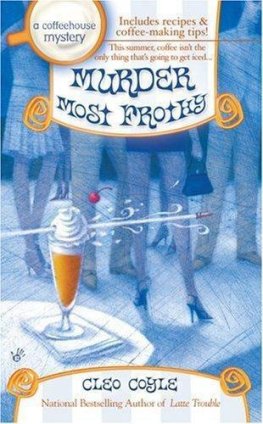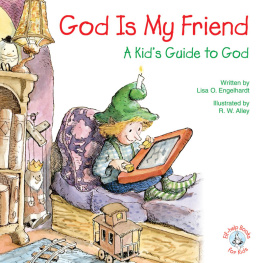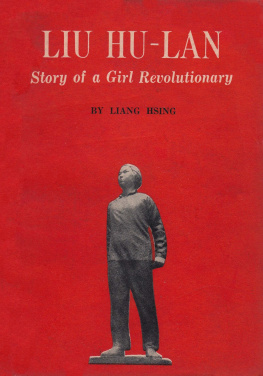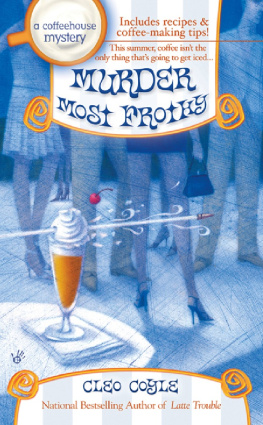
TODAY PROMISED TO BE ONE OF THE HOTTEST OF THE LONG summer in the interior of China. Here, the heat and humidity baked the earth and all upon it, so that by the time Ling Suchee reached the patch of ground where she grew her home vegetables, her clothes had already begun to stick to her skin. Suchee selected a turnip and two green onions, and pulled them gently from the red earth. Straightening up, she looked around. The fields stretched out before her, and the air shimmered in undulating waves. There were no trees to provide shade or a place to hide.
Where was her daughter?
Suchee glanced over to the rubble wall that served as the primary barrier between the fields and the pigsty. Last night she had seen Miaoshan lingering there as if it held some secret. But she wasn't there now, and Suchee went back inside. She sliced open the buns, tucked an onion and a piece of turnip in each, and squeezed the bread closed. No point in waiting for Miaoshan, Suchee decided, taking her first pungent bite of breakfast. Miaoshan must have gone to see her fiance Tsai Bing. They had talked last night and probably met again this morning to make plans. Suchee took another bite of the bun and tried to push the embarrassment of her daughter's pregnancy from her mind, knowing she should focus instead on the joy that lay ahead of them. A wedding. A baby. All this to come so soon.
But it was not so easy to put away fear. During the night Suchee's dreams had been uneasy, disturbing, and now, sweating not just from the summer heat but from deep anxiety, she was reminded of the old saying: Fifteen buckets drawing water from the well-seven moving up, eight moving down. Last night she had lost more buckets of sleep than she had gained. Suchee shook away this unpleasant memory. She gathered the crumbs from the table, took them outside, and scattered them on the ground for the chickens. She walked around to the back of her one-room cottage, silently chastising herself for letting her night dreams become her daytime worries. Nevertheless she couldn't help but survey her surroundings, taking inventory of her property as she crossed the hard-packed earth. She counted her wealth-three chickens in the front, six ducks out back- all healthy, all here. She saw the pig-fine, alive. But where was that girl? Suchee stared out again across her fields, this time looking at the white-hot sky. There were no clouds, so there would not be any rain to bring relief from the heat. This was as it should be. Most peasants knew when a big storm was coming, for when it did the rain would pour out of the sky in sheets for days and days, sometimes washing away an entire crop, an entire farm, an entire village. Did this day hold a dust storm in its minutes and hours? Is that what she sensed? Dust storms were common in spring, and Suchee and Miaoshan had watched many times as the soil was lifted up and carried out of sight to some other farmer's tract in a neighboring district. Could this be what she felt? Some tragedy that had stirred itself in the wrong season and would ruin her crops by day's end? Suchee held her hand to her forehead to shield her eyes from the sun and searched the sky, but it was perfectly blue and clear.
But as Suchee approached the shed, she was once again flooded with the sense that something was not right. She saw her tools propped against the mud siding. Someone had rearranged them. She was not stupid like the lowest barefoot peasant, and so she took care of her tools. They were the means by which she had kept herself and her daughter alive all these years. Had Miaoshan moved them? That couldn't be right, because mother had taught daughter the value of care and neatness. Just then Suchee realized that her ladder was missing. Hooligans must have come in the night and stolen it! If they had taken the ladder, could they have pirated away her ox too?
Suchee hurried to the shed, lifted the latch, and pushed open the door. Before her eyes could adjust to the dim interior, she stepped into the little room and gasped as she stumbled to the ground. She tried to sit up, but found herself tangled in the rungs of the ladder. Extricating herself, she sat there, rubbing first her shin, then an elbow, wondering what the ladder was doing here, right inside the door where anyone could fall.
As she peered into the darkness, she saw two feet swinging back and forth ever so slowly. With growing dread Suchee's eyes followed those feet up to the knees, then thighs, then hips, then torso, and finally to the neck and head of her daughter. A scream started to form in Suchee's throat as she saw Miaoshan's head tilted at an inhuman angle. Part of a rope necklace was buried in the swollen flesh of her neck; the other end was slip-tied to a rough-hewn support beam. Her tongue-purple and grossly swollen-protruded from her mouth. Her eyes bulged as though someone were pushing them from the inside. They were open, bloodshot, unseeing. "No-o-o-o," Suchee wailed as she saw one of the flies that already buzzed around her daughter's head break away from the swarm, dive down, and land at the corner of Miaoshan's unmoving right eye.
Suchee tried to scramble to her feet, once again tripping in the rungs of the ladder. Regaining her balance, she reached for her daughter. With a swoop Suchee wrapped her powerful arms around Miaoshan's thighs and lifted her body to take the weight off her neck. Standing there-her head against the small, hard mound of her daughter's stomach-Suchee knew it was too late. Miaoshan was dead, as was the grandchild that lay inside her.
The three generations stood this way together for a long time. Finally, Suchee gently released her daughter's legs and went back outside to get the scythe, feeling an emptiness that stretched beyond the distant horizon.
Those first moments after finding Miaoshan would be indelibly printed on Suchee's mind: cutting down the body, laying it out on the dirt floor of the shed, then running along the raised pathways between the fields to the land of her closest neighbors. The Tsai family-mother, father, and only son-were already working, bent over as they pulled weeds from around their crop plants. At the sound of Suchee's screams they looked up simultaneously, almost as a small herd of deer startled by a predator. Then they too were screaming and running back to the Ling farm.
Faced with this crisis, Tsai Bing, Miaoshan's betrothed, finally put his head to use. With promises that he would be back, he took off, jogging down the red dirt road that led first to the highway and then to the village of Da Shui. An hour later he returned with policemen from the local Public Security Bureau. By this time some other neighbors had gathered around to watch the unfolding catastrophe. The man in charge introduced himself formally as Captain Woo, although they had known him all of their lives. He firmly insisted that the neighbors return to their own farms. As they shuffled past, a few murmured their condolences. Tang Dan, the wealthiest of Suchee's neighbors, stopped before her and addressed her formally, "We are so sorry, Ling Taitai. If you need anything, remember to come to me. I will help you in any way I can." Then he too left, so that the only people remaining were the police, Suchee, and the Tsais.
"Auntie Tsai, Uncle Tsai," Woo said, using the polite honorific, "you have much work to do. We will take care of things here. And you, Tsai Bing, help your parents. We will come for you if we need you."
Madame Tsai looked questioningly from Suchee to Captain Woo and back again. But all of them knew one thing: The Tsais were insignificant people. They could not disobey a policeman. And so the Tsais padded away, with Tsai Bing occasionally glancing back over his shoulder.
Next page

